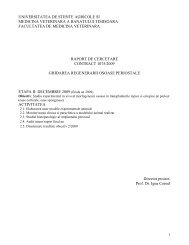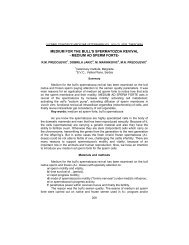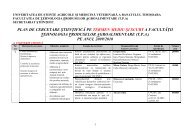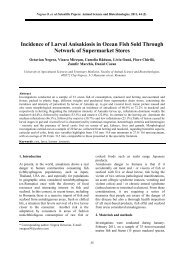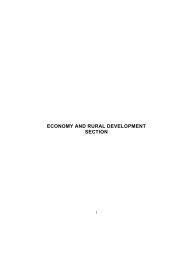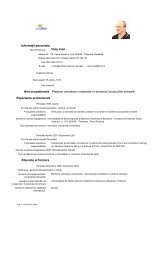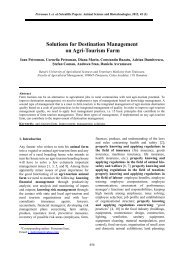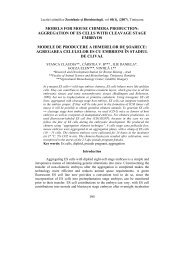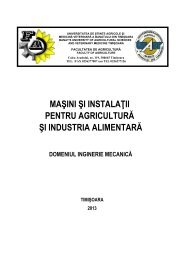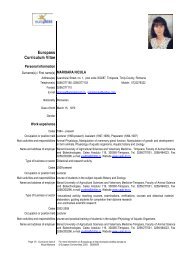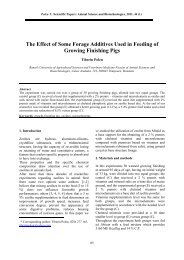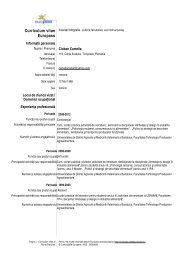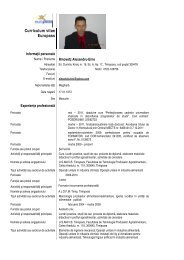journal of linguistic studies
journal of linguistic studies
journal of linguistic studies
Create successful ePaper yourself
Turn your PDF publications into a flip-book with our unique Google optimized e-Paper software.
ENGLISH PROFILE<br />
JULIA HARRISON<br />
Cambridge University Press, Cambridge, England<br />
jxharrison@cambridge.org<br />
English Pr<strong>of</strong>ile is a global, community programme <strong>of</strong> research that <strong>studies</strong> how<br />
people learn English, and aims to enhance the learning, teaching and assessment <strong>of</strong><br />
English worldwide. It is backed by the Council <strong>of</strong> Europe, and linked to the Common<br />
European Framework <strong>of</strong> Reference for Languages (CEF). The CEF was developed as a<br />
Council <strong>of</strong> Europe initiative to provide objective criteria for describing the different<br />
levels <strong>of</strong> language pr<strong>of</strong>iciency. There are 6 different levels within the CEF, from A1 to<br />
C2, and a series <strong>of</strong> statements are used to describe what a learner ‘can do’, that is, what<br />
functions they can perform using the language, at each level. Since its development began<br />
back in 1971, the CEF has become a valuable resource for language pr<strong>of</strong>essionals in all<br />
areas, both as a basis for identifying teaching and learning objectives, and also as a way<br />
to “facilitate the mutual recognition <strong>of</strong> qualifications gained in different learning<br />
contexts” (Council <strong>of</strong> Europe, 2001).<br />
English Pr<strong>of</strong>ile will build on the CEF by providing a set <strong>of</strong> Reference Level<br />
Descriptions for each level for the English language, which together will create a ‘pr<strong>of</strong>ile’<br />
<strong>of</strong> English. They will provide detailed information about the language that learners can be<br />
expected to demonstrate at each level, by providing descriptions <strong>of</strong> the grammar,<br />
vocabulary, functions etc required at that level. Ultimately English Pr<strong>of</strong>ile will <strong>of</strong>fer a<br />
clear benchmark for the progress <strong>of</strong> learners that will be internationally understood by<br />
educators and employers alike. The results <strong>of</strong> its activities are expected to have an<br />
important impact on a variety <strong>of</strong> fields, primarily language pedagogy and applied<br />
<strong>linguistic</strong>s, serving as a tool for teacher training, materials development and assessment<br />
for many years to come.<br />
USING REAL LEARNER ENGLISH – THE CORPUS DRIVEN APPROACH<br />
Previous language pr<strong>of</strong>iles have been produced by language specialists and have been<br />
personal, however expert, conclusions from an individual’s experience. English Pr<strong>of</strong>ile’s<br />
unique methodology involves research which looks at the actual language that learners<br />
produce. What this means is that EP’s findings will be based on empirical evidence <strong>of</strong><br />
what learners can actually do at each level (i.e. on real life examples <strong>of</strong> learners’ output)<br />
thus ensuring that the resultant Reference Level Descriptors are as accurate, detailed, and<br />
comprehensive as possible.<br />
This will involve the use <strong>of</strong> a corpus <strong>of</strong> learner data, which the EP Network is<br />
working together to build. We aim to collect ten million words <strong>of</strong> data, which will include<br />
examples <strong>of</strong> the work <strong>of</strong> learners who are at all levels <strong>of</strong> pr<strong>of</strong>iciency, and encompassing a<br />
wide range <strong>of</strong> ages and first languages. We need this data because another aspect <strong>of</strong> EP’s<br />
approach is that it hopes to avoid 'lingua-centricity', meaning that it will not solely be<br />
concerned with English as it is spoken in the UK by native speakers. It is important that<br />
the impact <strong>of</strong> different first languages, learning contexts and transfer effects should be<br />
taken into account. Therefore the idea <strong>of</strong> an ‘English Pr<strong>of</strong>ile community’ (see below) is<br />
central to the Programme’s success, and we hope that that people involved in English<br />
Language Teaching all over the world will join our network.<br />
89



